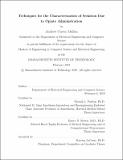| dc.contributor.advisor | Patrick L. Purdon and Emery N. Brown. | en_US |
| dc.contributor.author | Mullen, Andrew Carter. | en_US |
| dc.contributor.other | Massachusetts Institute of Technology. Department of Electrical Engineering and Computer Science. | en_US |
| dc.date.accessioned | 2019-07-15T20:33:43Z | |
| dc.date.available | 2019-07-15T20:33:43Z | |
| dc.date.copyright | 2019 | en_US |
| dc.date.issued | 2019 | en_US |
| dc.identifier.uri | https://hdl.handle.net/1721.1/121682 | |
| dc.description | This electronic version was submitted by the student author. The certified thesis is available in the Institute Archives and Special Collections. | en_US |
| dc.description | Thesis: M. Eng., Massachusetts Institute of Technology, Department of Electrical Engineering and Computer Science, 2019 | en_US |
| dc.description | Cataloged from student-submitted PDF version of thesis. | en_US |
| dc.description | Includes bibliographical references (pages 69-71). | en_US |
| dc.description.abstract | The focus of this thesis is identifying human physiologic markers during opiate sedation for applications in general anesthesia and drug overdose. Under this central topic, three themes are developed: characterizing the neural signature associated with altered consciousness due to opiate administration, characterizing the diminished respiration and behavioral effects of sedation due to opiate administration, and correlating these features. This work led to the development of signal processing techniques using state-space autoregressive equations to model respiratory data. Additionally, this project required designing and conducting a clinical experiment at the Massachusetts General Hospital with the permission of the Partners Institutional Review Board and the guidance of the Anesthesia, Critical Care, and Pain Management department at the Massachusetts General Hospital. The data used in this investigation were collected in the operating rooms at the Massachusetts General Hospital with the help of anesthesiologists, surgeons, nursing staff, and clinical research coordinators. | en_US |
| dc.description.statementofresponsibility | by Andrew Carter Mullen. | en_US |
| dc.format.extent | 71 pages | en_US |
| dc.language.iso | eng | en_US |
| dc.publisher | Massachusetts Institute of Technology | en_US |
| dc.rights | MIT theses are protected by copyright. They may be viewed, downloaded, or printed from this source but further reproduction or distribution in any format is prohibited without written permission. | en_US |
| dc.rights.uri | http://dspace.mit.edu/handle/1721.1/7582 | en_US |
| dc.subject | Electrical Engineering and Computer Science. | en_US |
| dc.title | Techniques for the characterization of sedation due to opiate administration | en_US |
| dc.type | Thesis | en_US |
| dc.description.degree | M. Eng. | en_US |
| dc.contributor.department | Massachusetts Institute of Technology. Department of Electrical Engineering and Computer Science | en_US |
| dc.identifier.oclc | 1102057211 | en_US |
| dc.description.collection | M.Eng. Massachusetts Institute of Technology, Department of Electrical Engineering and Computer Science | en_US |
| dspace.imported | 2019-07-15T20:33:40Z | en_US |
| mit.thesis.degree | Master | en_US |
| mit.thesis.department | EECS | en_US |
